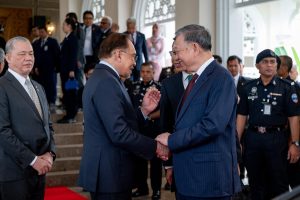Vietnam and Malaysia have announced the establishment of a Comprehensive Strategic Partnership (CSP), making Malaysia the first member state of the Association of Southeast Asian Nations (ASEAN) to rise to the top of Hanoi’s diplomatic hierarchy.
The announcement was made yesterday by Malaysian Prime Minister Anwar Ibrahim and To Lam, the general secretary of the Communist Party of Vietnam (CPV), who is currently on a three-day state visit to Malaysia.
In a joint press briefing with Anwar in Putrajaya, Lam, the first CPV chief to visit Malaysia since 1994, said that the CSP would “open a new chapter for cooperation between the two countries for peace and stability,” Lam said. He and Anwar pledged to “support each other on our respective courses of development” and to “work closely to expand and deepen our friendship and political trust,” Lam added, according to Malaysian state media agency Bernama. The two nations established a strategic partnership in 2015.
As befits the establishment of a CSP, the two sides issued a joint statement laying out a sweeping agenda that included defense and security issues, science and technology, green energy, education, human resources development, culture, sports, and tourism. Ahead of the press briefing, the leaders witnessed the signing of memorandums of understanding on cooperation in trade promotion and cooperation between state energy firms Petronas and PetroVietnam in the field of renewable energy.
Perhaps most notable was the pledge to strengthen maritime cooperation in the South China Sea, where both nations dispute China’s expansive maritime and territorial claims.
In their joint statement, the two sides promised to “continue working closely together to maintain peace, security, stability, safety and freedom of navigation and overflight in the South China Sea and to promote peaceful settlement of disputes.” The statement also mentioned the importance of adhering to international law, including the United Nations Convention on the Law of the Sea (UNCLOS) and “reaffirmed the importance for all parties concerned to exercise self-restraint,” and to “refrain from undertaking activities that could escalate tension which in turn could affect peace and stability in the South China Sea.”
While Malaysia and Vietnam have a shared interest in pushing back against Beijing’s claims in the South China Sea, they have their own overlapping claims, which have prevented them from forming a united front against China. Earlier this month, Reuters reported that Malaysia lodged a protest over Vietnam’s island-building program in the Spratly Islands. The two nations’ claims also clash with those of the Philippines, which also has claims in the Spratly archipelago. Last week, Malaysia also protested the Philippines’ passage of two new maritime laws, which it said touched upon a separate bilateral dispute over the eastern Malaysian state of Sabah.
With yesterday’s upgrade, Malaysia has become the ninth nation to be promoted to the top tier of Vietnam’s diplomatic hierarchy, after China (2008), Russia (2012), India (2016), South Korea (2022), the United States (2023), and Japan (2023). Australia and France then joined the club in March and October, respectively. While Malaysia is the first ASEAN member state to raise its partnership to the top level of Vietnam’s diplomatic hierarchy, further CSPs with Indonesia and Singapore are also reportedly under discussion.
As I noted last month, when the upgrade with France was announced, the sudden rash of upgrades suggests “a concerted attempt to broaden and deepen Vietnam’s relationships with important regional and global powers.” It thus marks the operationalization of the country’s omnidirectional foreign policy, which seeks fruitful relations with as many important powers as possible.
Aside from maritime security, the two nations stand to benefit from the expansion of the economic agreement. Malaysia is currently Vietnam’s second-largest trade partner in ASEAN and the third-largest foreign investor among ASEAN countries. Meanwhile, Vietnam is the Malaysia’s fourth-largest trade partner in ASEAN. The joint statement pledged to expand two-way trade to $18 billion, up from nearly $13 billion in 2023.

































